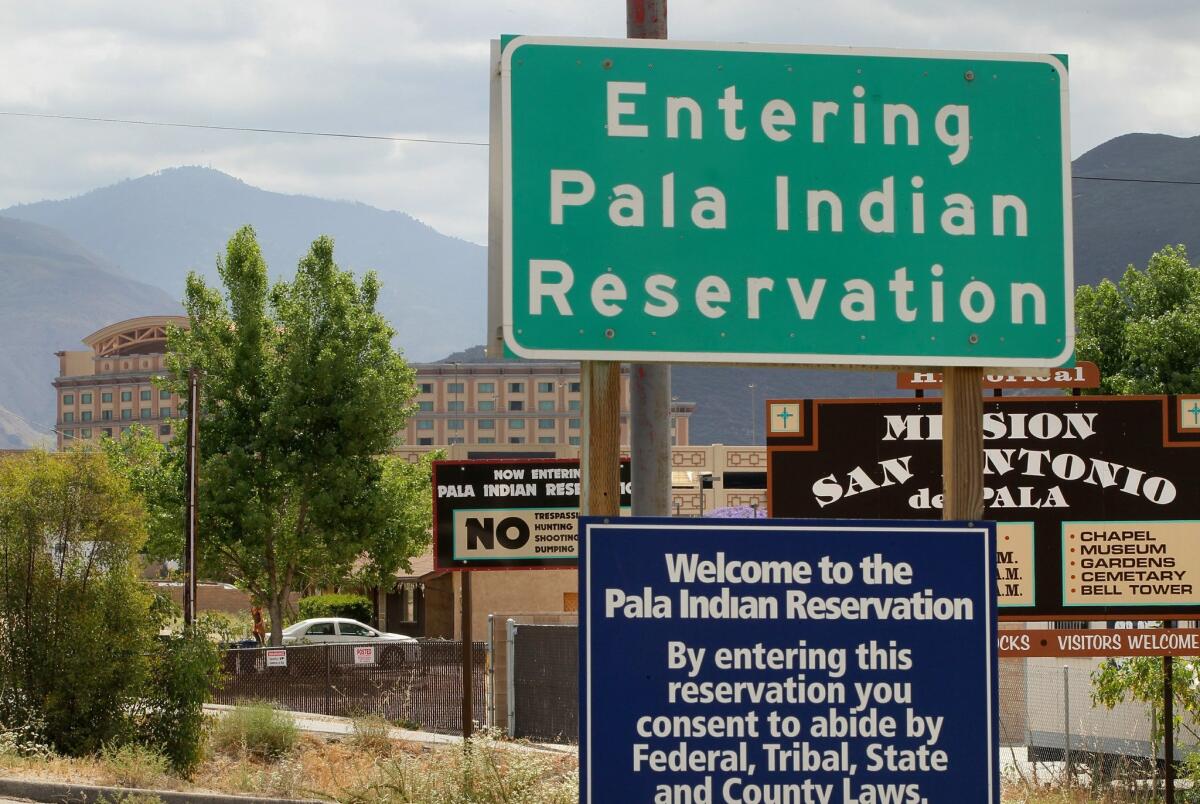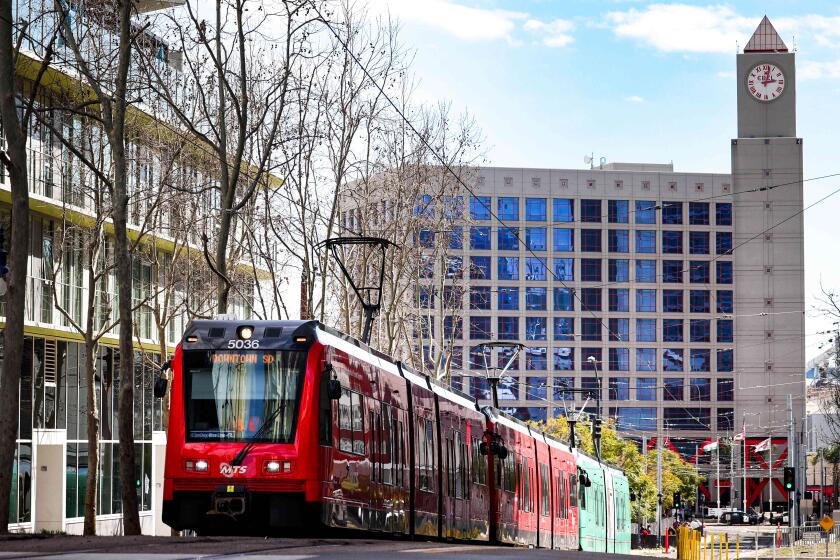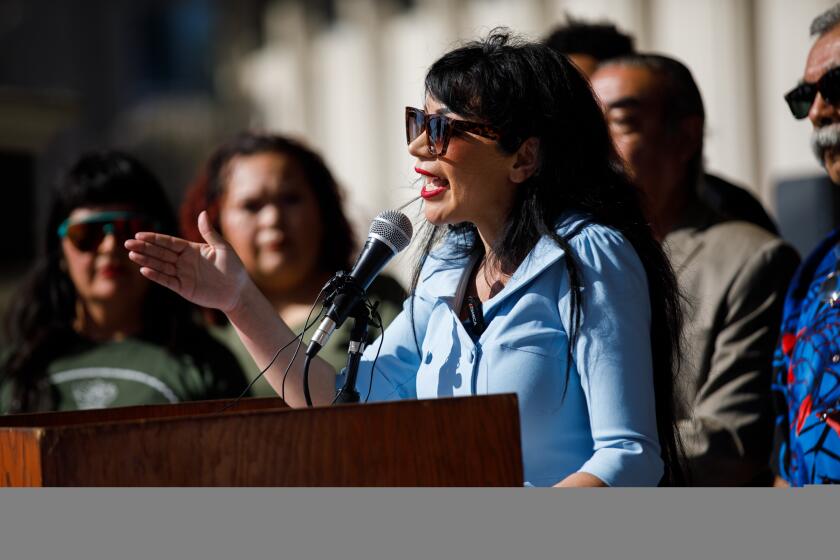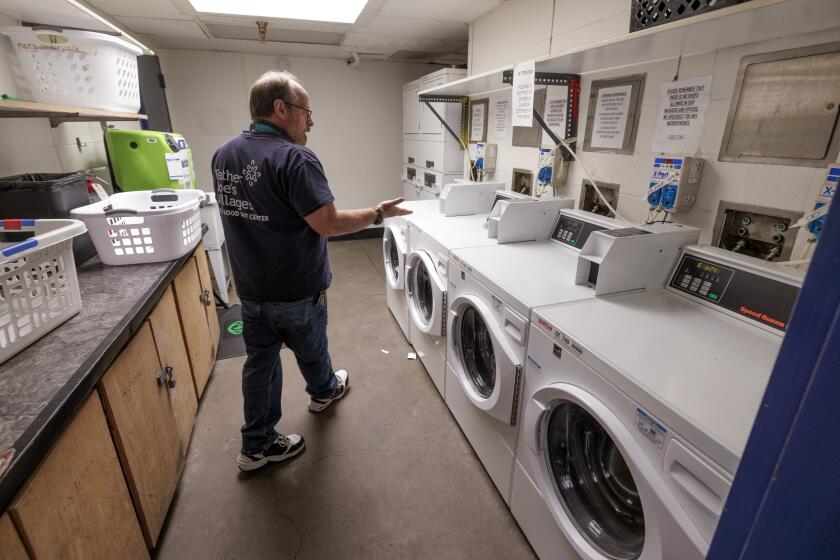San Diego tribes keep close eye on Prop. 48
Opponents see ‘explosion of urban gaming,’ supporters see limited change
Could a measure on the November ballot that deals with a dusty Central Valley town pave the way for Indian casinos in big cities across California, perhaps even in downtown San Diego?
Could it help tribes in rugged, remote parts of San Diego County establish their first casino, miles from their tribal lands?
Opponents of Proposition 48, including casino-owning tribes who feel threatened by new gaming centers, say it could. Supporters, meanwhile, say the measure promotes self-reliance for two small tribes but won’t open the flood gates to urban casinos.
PROPOSITION 48
What it does: Gives California voters a chance to approve or reject a deal signed by the governor and passed by the Legislature that would allow the North Fork Rancheria Band of Mono Indians to build a casino with up to 2,000 slot machines about 30 miles northwest of Fresno. Much of the debate centers on whether this would open the door to off-reservation casinos in California.
Who supports it: Gov. Jerry Brown and narrow majorities in the Legislature. The Democratic State Central Committee of California. Las Vegas-based Station Casinos, which is behind the project.
Who opposes it: Other casino-owning tribes, including the Table Mountain Rancheria, the United Auburn Indian Community of the Auburn Rancheria and the Pala Band of Mission Indians in San Diego County; New York-based Brigade Capital Management, an investment firm that backs the Chukchansi Gold Resort & Casino, another Indian casino near the site of the proposed North Fork casino.
The proposition asks voters to decide whether the North Fork band of Mono Indians, a small tribe tucked in the Sierra foothills, should be able to open a casino 38 miles west in Madera. It’s a more visible and potentially lucrative spot for gaming off Highway 99 in the Central Valley, compared with the tribe’s remote land near Yosemite. The Wiyot tribe in Humbolt County would receive a share of revenue from the Madera casino in exchange for not building a gaming center on its land near a national wildlife refuge.
Opponents, including a tribe with a casino near Fresno, not far from Madera, say a ‘yes’ vote on Prop. 48 could lead to “reservation shopping” with tribes seeking to open casinos from San Diego to San Francisco. They say approval would break a promise to California voters who authorized Indian casinos on tribal territory only, more than a decade ago.

“It would result in an explosion of urban gaming,” said Doug Elmets, spokesman for the Pala Band of Mission Indians, which owns a casino on its land in North San Diego County east of Interstate 15. “It would go against the tribes that have played by the rules for nearly a generation.”
“Prop. 48 is not just about North Fork building (a casino) in Madera,” he added. “It is a strong message that Californians are fine with gaming in major metropolitan areas in California.”
By contrast, supporters like Gov. Jerry Brown, say the North Fork proposal includes “exceptional circumstances” that will prevent it from setting a statewide precedent. Those circumstances include the North Fork tribe’s significant historical connection to Madera, and support for the casino from city and county governments in Madera.
In 2012, the federal government placed 305 acres in Madera County in a trust for the North Fork tribe’s casino. The governor and Legislature approved compacts with the North Fork and Wiyot tribes the same year. The ballot measure is a referendum on the compacts and has put the deals on hold. A ‘no’ vote on 48 would kill the agreements, jeopardizing the casino plans.
Local backer
Supporting Prop. 48 is Will Micklin, the top administrator for the Ewiiaapaayp Band of Kumeyaay Indians, a small San Diego County tribe. He also serves as executive director of the 32-member California Association of Tribal Governments.
“Tribes throughout California support these (compacts). They provide the state with much-needed revenues and provide smaller, non-gaming tribes funding to help Native people become self-reliant,” Micklin said in a statement on the Yes on Prop. 48 campaign website, speaking for the statewide association.
In 2008, federal officials rejected a joint venture casino proposal on the Viejas reservation near Alpine between Viejas and the Ewiiaapaayp (pronounced wee-ah-pie), a tribe that includes just a handful of members.
The two tribes would have shared profits from the venture.
Micklin could not be reached this week to comment on whether the tribe has any current casino plans.
Small tribes like the Ewiiaapaayp would benefit from the measure even if they never establish their own gaming center.
That’s because the compact signed by the state requires payments from the Madera casino revenue to the state revenue-sharing fund that provides money to 73 California tribes that either have no casino or have a casino with fewer than 350 slot machines.
Close eye from local tribes
Prop. 48 is being watched closely in San Diego County, home to 18 Indian tribes, the largest concentration of any county in the United States.
Representatives for several large local tribes, including Sycuan and Viejas, said their leadership had not taken a formal position on the measure.
One high-level official with a San Diego area tribe who asked not to be identified said he doesn't believe Prop. 48 will lead to an avalanche of tribes seeking off-reservation casinos, especially not in major urban centers. He said acquiring federal and state approvals for such a venture is long and rigorous and would be met with stiff public opposition.
Not all local tribes are sitting on the sidelines.
The Pechanga tribe, which owns the Pechanga Resort & Casino in Temecula, has voiced strong opposition to Prop. 48 and recently formed a campaign committee to push against the measure.
For Dave Toler, a member of the tribal council of the San Pasqual Band of Mission Indians in Valley Center, deciding whether to back the measure isn’t easy.
He noted that his tribe, which owns Valley View Casino and Hotel, hasn’t yet taken a stand on the measure and that he was speaking for himself.
“It bothers me a bit to think that you’re changing the provisions that the voters approved,” Toler said, referring to Prop. 1A, which was passed by voters in 2000 and allows gaming on reservations. “On the other hand, we’d be denying people we’re related to and have relationships with if this is voted down. They would be deprived of the right to do gaming.”
A boost to Barstow plan?
Several local tribal officials said Prop. 48 could help the casino dreams of a small tribe in San Diego County’s remote northeast county.
For nearly a decade, the Los Coyotes Band of Cahuilla and Cupeño Indians have sought to build a gaming center in Barstow, more than 150 miles from the tribe’s mountainous Warner Springs area reservation.
Federal officials rejected the Barstow casino plan in 2008, saying the high-desert city was too far away and could have a negative effect on the reservation by drawing too many members away from it. Los Coyotes submitted a revised proposal later the same year.
In April, the tribe and city of Barstow, which supports the project, released a joint news release saying their project had taken “a giant step forward” when the federal government published a key environmental document for the project finding no detrimental impacts from the revised project.
“It is our hope that completion of this procedural step will bring our tribal members and the citizens of Barstow one step closer to hundreds of jobs, opportunity and self-sufficiency,” Shane Chapperosa, chairman of the Los Coyotes tribe, said in the news release.
Neither Chapperosa nor a representative for BarWest Gaming, the tribe’s casino development partner, responded to requests for comment.
Thad Kousser, a political science professor at UC San Diego, said the affect of Prop. 48 is hard to predict. Some say a ‘no’ vote could permanently stall small tribes’ plans for self-sufficiency. Others say approval could unleash a torrent of unchecked gaming.
Kousser said the answer probably lies somewhere in the middle.
“It could set a precedent in Californians’ minds. If taken to its logical extreme, this could lead to Vegas-style gaming inside cities all over California. (But) there are lots of checks and balances before that happens,” Kousser said. “You can open a door a crack without blowing it wide open.”
chris.nichols@utsandiego.com | (916) 445-2934 | Twitter@ChrisTheJourno
Get Essential San Diego, weekday mornings
Get top headlines from the Union-Tribune in your inbox weekday mornings, including top news, local, sports, business, entertainment and opinion.
You may occasionally receive promotional content from the San Diego Union-Tribune.







